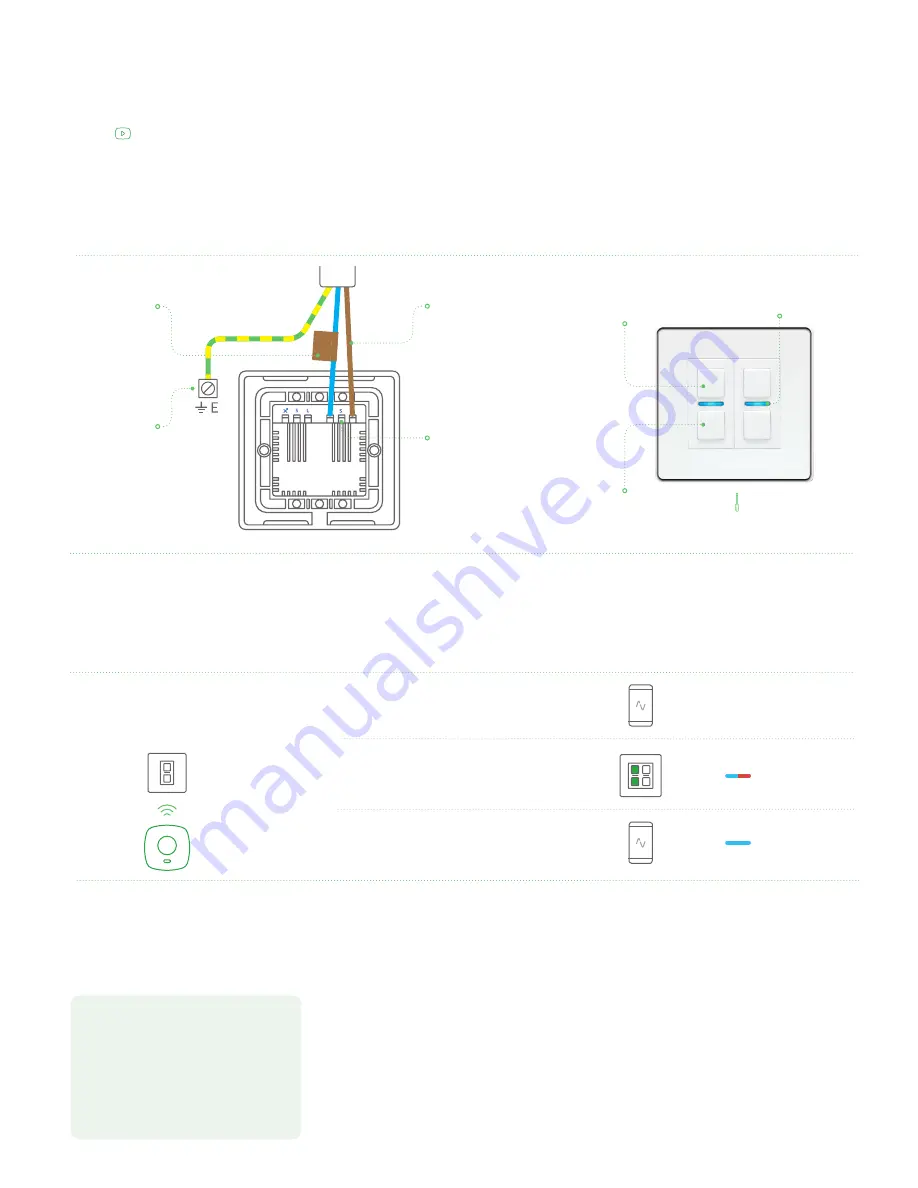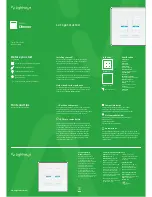
Install the Dimmer
Carefully follow the instructions in this section in
order to install the Dimmer. Please remember that
live electricity is dangerous. Do not take any risks.
If in any doubt, consult a qualified professional.
For other advice, please contact our dedicated
technical support team on 0121 250 3625.
1
The easiest way to learn how to install the Lightwave
Dimmer is to watch our short installation video which
is accessible at
Turn off the mains power supply to your existing lighting
circuit at the consumer unit.
1.1 Turn off the mains electricity supply
Unscrew the existing light-switch and remove the wires. It is
often a good idea to take a quick photo of the existing wiring
configuration. This can help you to remember which wires connect
to which terminals if there are more than two, or if they are not
distinctly labelled. The existing wiring should be colour coded and
arranged as per the wiring diagram provided in these instructions,
however, please be aware that not all existing wiring will conform
to this standard and may differ.
1.2 Remove the existing switch
Remove the faceplate from the Lightwave Dimmer by carefully
inserting a screwdriver into the small slot located at the bottom
edge of the cover.
1.3 Remove the faceplate
Carefully wire the Dimmer as shown in the diagram. Be aware
that existing cables can vary in colour and may not always be
correctly labelled. If in any doubt, always consult a qualified
electrician. Replace the faceplate by hooking it onto the
top edge of the Dimmer and clipping in the bottom. Check
the wiring and load; remember not to exceed the 350W
incandescent load and to only use recommended dimmable
LED lamps.
1.4 Wire the Dimmer
Earth wire
this should
also be connected to earth
terminal in the back box if
one exists (important when
using metal back boxes).
Switched live wire out
.
This should be blue or
black in colour. It may be
marked by brown/red tape
to emphasise that it is not
a neutral wire.
Repeat wiring
for
second dimmer gang
Live wire in
.
This should be brown
or red in colour.
www.lightwaverf.com/product-manuals
Off button
Tap to turn off
Hold to decrease light level
LED
Indicator light
Screwdriver slot.
To remove the cover plate.
GETTING STARTED
Link the Dimmer
Calibration
3
2
To be able to command the Dimmer,
you will need to link it to the Link Plus.
Other Dimmer
functions
4
Please follow the in-app instructions which will explain
how to link devices.
On the Dimmer, press and hold down ‘on’ / ‘off’ button until
the LED flashes blue and red alternately then release it.
The Dimmer is now in linking mode.
Using the Lightwave App, press the button you want to link to (the
App instructions will guide you through this). The blue light on the
Dimmer switch will flash to confirm that it is now linked to the App.
Unlinking the Dimmer
To unlink the Dimmer and clear the memory, enter linking mode
by holding down both on/off buttons until the LED flashes red.
Release the buttons, then hold the off button until the LED flashes
rapidly to confirm that the memory has been cleared. On clearing
the memory, automatic calibration will be initiated.
Locking the Dimmer
The Dimmer can be ‘locked’ using the App so that the manual
buttons will not operate it. If it is locked on, then the Dimmer will
not turn off manually. A locked dimmer is signified by a slow flashing
magenta LED. To lock / unlock the Dimmer, press the ‘lock’ button
on the Smartphone App. Clearing the memory will remove the lock.
Changing the colour of the indicator LED
The colour of the LED indicator lights on the Dimmer can be
changed or the LED turned off using the Lightwave App. See the
App for more details.
Multi-way switching
Lightwave Dimmers perform 2-way or multi-way switching
wirelessly. This means that they can be wired into a circuit using
only a live in and switched live out, and communication between
them is carried out via wireless RF frequency. Dimmers can be
linked to perform multi-way switching using the ‘group’ automation
feature on the Lightwave App (see the App for more details).
Firmware updates
Firmware updates are over the air software improvements that keep
your device up to date as well as providing new features. Updates
can be approved from the App before being implemented, and
generally take 2-5 minutes. The LED will flash cyan in colour during
an update. Please do not interrupt the process during this time.
Error reporting
A permanently flashing red LED indicates that a software or
hardware error has been encountered. Press the on/off button to
reset the indicator LED. If the error light persists, please contact
Lightwave support via www.lightwaverf.com/support.
Visit
www.lightwaverf.com
to discover the latest
product updates and find out what else you can do
with Lightwave products.
For advice, troubleshooting and technical support,
please see www.lightwaverf.com/support
Follow Lightwave
Once the dimmer has been installed, lamps added to
the circuit and the power switched on, it will enter
calibration mode. This mode calculates the appropriate
settings and dimming range to maximise compatibility
with the lamps being used on the circuit.
On button
Tap to turn on
Hold to raise light level
Double tap to go to full brightness
Automatic calibration
If the dimmer has not previously been calibrated, it will automatically
calibrate itself to the lamps detected on the circuit after 5 seconds. If the
dimmer has been calibrated previously, these settings will be restored
unless the on button is pressed within 5 seconds to overwrite them with a
new calibration (recommended if lamps are changed). Auto calibration is
denoted by flashing green LEDs.
Manual calibration
(use in the event of persistent lamp flicker or instability)
Pressing the off button within 5 seconds of introducing power to the Dimmer
will initiate manual calibration. This is initially denoted by flashing green and
red LEDs. Pressing the on and off buttons now will extend or shorten the
lower dimming limit. Pressing both buttons together will save the setting.
Next, flashing green and blue LEDs denote that pressing the on and off
buttons will now alter the upper limit. Press both buttons to save this setting.


